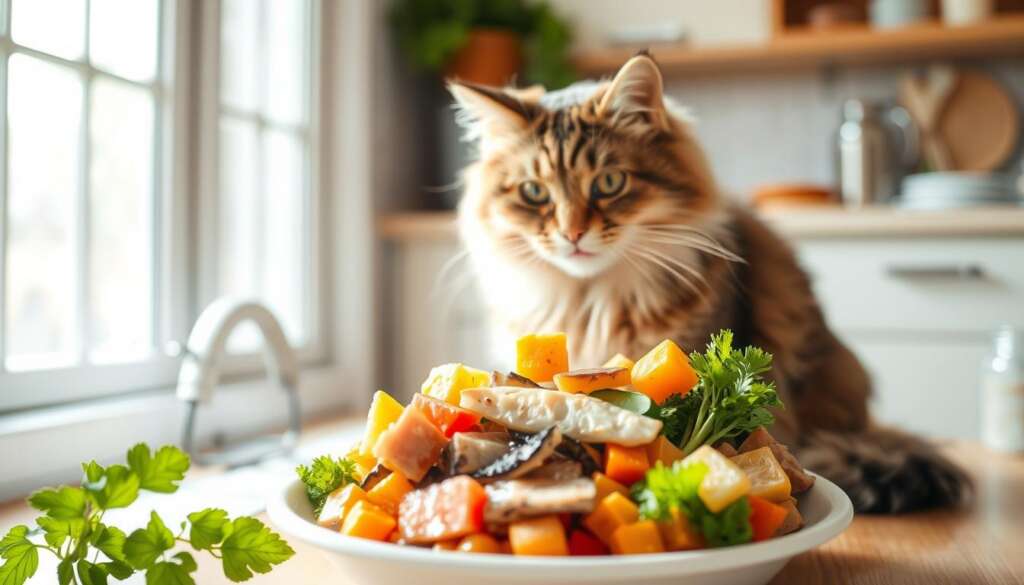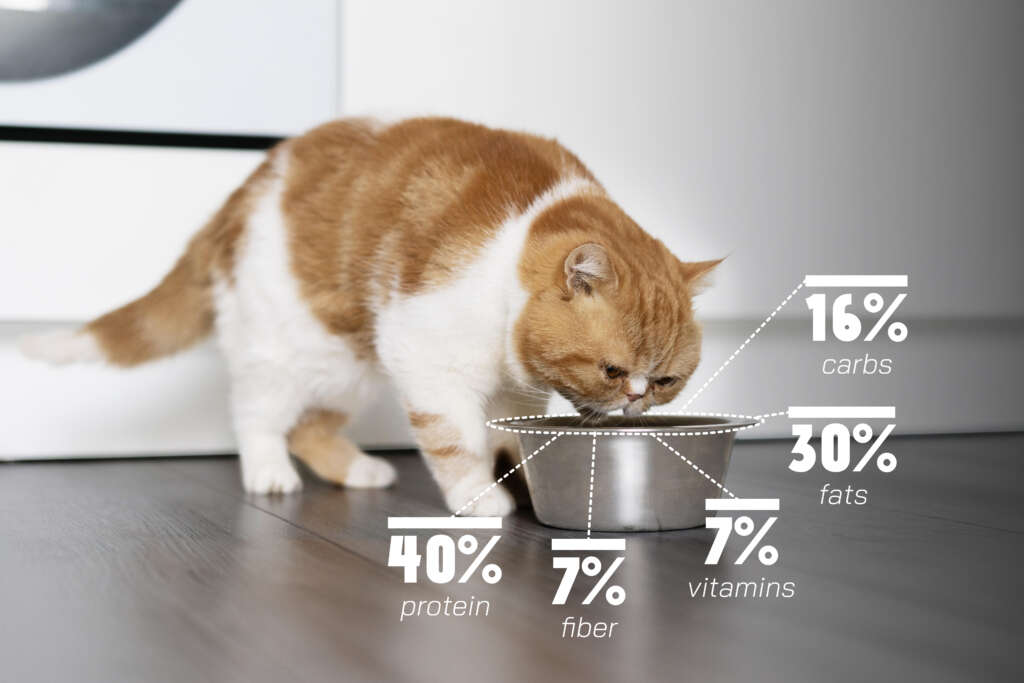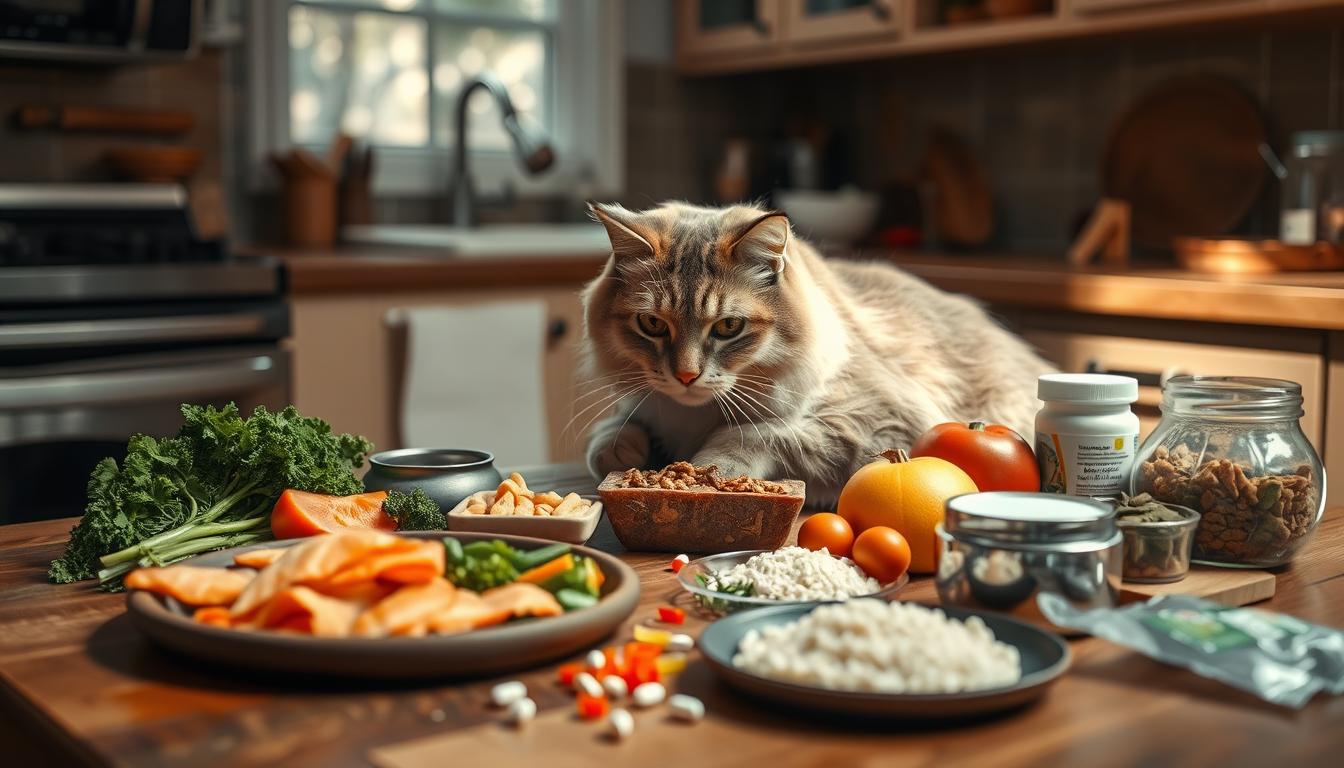Share This Article
As your feline friend curls up in her sunlit corner, whispering secrets to her seasoned whiskers, a crucial question looms: Could the key to her golden years be nestled in her bowl? When was the last time you assessed the proper diet for senior felines? With cats spending roughly 40% of their lives as seniors, understanding senior cat nutrition is critical to romance the twilight of their nine lives.
An elder cat is a tapestry of tales and purrs, their needs transforming with the waning days. Their once robust metabolism softens, inviting a cascade of health shifts that demand attention. With dietary changes for senior cats, we’re not just filling a bowl; we’re crafting a fountain of youth. The secret may lie in a delicate balance of those 41 essential nutrients – but how many cat owners truly know what changes to make?
Ensuring that a proper diet for senior felines is more than a compassionate pat; it’s a scientific venture. Studies have illuminated that the grace of a cat’s senior years hinges on dietary fine-tuning, from incorporating Omega-3 fatty acids to aid their aching joints to favoring foods enriched with vitamin E to fortify their aging defenses.
So, before you succumb to the allure of a commercial “senior formula,” pause. Peer into the depths of informed decision-making, where every bite can either sustain or strain the vitality of your cherished companion. The truth about senior cat nutrition is not stamped on a label; it’s scrawled in the annals of veterinary expertise and tailored compassion. Reach beyond the generic, and let us usher you into the bespoke realm of dietary changes for senior cats—an odyssey that begins, endearingly, with knowledge.
Understanding the Aging Cat: Signs Your Feline is Becoming a Senior
As your cat gets older, it’s important to notice the early signs of aging. This includes feeding older cats right and giving them nutrition tips for aging cats. Cats are now considered seniors between 12 to 14 years old. This is because of better vet care and better food.
Physical and behavioral changes show your cat is getting older. You might see weight changes, less activity, or mood shifts. Regular vet visits are key to catch diseases early, like dental problems or brain issues.
Also, a balanced diet is more important as cats age. Their metabolism changes, so they need less food to stay healthy. Older cats also need more love and attention.
Knowing these signs helps make your cat’s life more comfortable. It also ensures they get the care and food they need to stay healthy as seniors.

Comprehensive Senior Cat Check-Ups: The Foundation of Health
As cats get older, usually between 10 to 14 years, they need more care. The American Association of Feline Practitioners says it’s key to see the vet every six months. These visits help keep their health in check and adjust their diet as needed.

Vets do a full check-up during these visits. They look at the cat’s body, skin, coat, and teeth. Since most cats over three have dental problems, this is important.
They also do blood tests to see how organs are working. This helps them make a diet plan that fits the cat’s health needs, like kidney or thyroid issues.
Senior cats need about 20% to 25% fewer calories. Vets suggest eating smaller meals, 3-4 times a day. This helps with digestion and keeps energy levels up. A good diet for seniors includes lots of protein and enough water to avoid dehydration.
Regular vet visits can cause health problems early. This means making diet and lifestyle changes sooner. It helps keep senior cats happy and healthy in their golden years.
Caregivers play a big role too. They need to watch for changes in appetite or behavior. This could mean the cat is sick. Making the home easier to move around in is also important for older cats.
Gauging the Nutrient Profile for Senior Cats
As cats get older, around 10 years, their diet needs to change. Food for senior cats must support these changes. It’s important to focus on an elderly cat’s diet that meets their specific needs. There’s no single diet for all senior cats, but some key nutrients are essential.
Senior cats often have weaker kidneys. They need diets low in phosphorus and sodium. This helps their kidneys and keeps them hydrated and balanced. As cats age, they digest fat and protein less well. A diet with easy-to-digest fats and proteins helps them stay healthy.
Calories are also important in a food for senior cats. Cats losing weight might need more calories. But, this must be balanced with their health and activity. A vet can help find the right amount of food and check weight regularly.
Older cats can get diseases like diabetes and arthritis. Elderly cat diet plans should consider these. Diets with omega-3 fatty acids can help with arthritis. And, cats with diabetes need to watch their carb intake.

In summary, there’s no one perfect diet for senior cats because they’re all different. But, it’s crucial to balance proteins, carbs, fats, vitamins, and minerals. Regular vet visits, careful diet choices, and health monitoring are key to keeping senior cats healthy.
Hydration: A Critical Component of Diet for Senior Cats
For senior cats, staying hydrated is key. As they age, their thirst decreases, making dehydration a big risk. Dehydration can lead to many health problems.
Even a small cat needs about a cup of water daily. But, it’s hard for them to drink enough because their bodies don’t respond as well. Adding wet food to their diet helps a lot. It has lots of water, helping them stay hydrated without just drinking from a bowl.
Senior cats need easy access to water. Place water stations around your home, away from their food. This helps them drink more. Try using cat water fountains or adding tuna or chicken broth to their water to make it more appealing.
Since senior cats sleep a lot, make sure water is easy to find. This way, they can drink without much effort.
It’s important to check your senior cat’s health often. This should happen every six months. Checking their hydration is part of this.
One way to check is by looking at their skin. But, this isn’t always enough for older cats. So, watching how much they drink is very important. It helps catch problems early, like kidney disease or diabetes.
If your cat gets very dehydrated, the vet might give them fluids. By keeping an eye on your cat’s hydration and making dietary changes, you can help them stay healthy longer.


